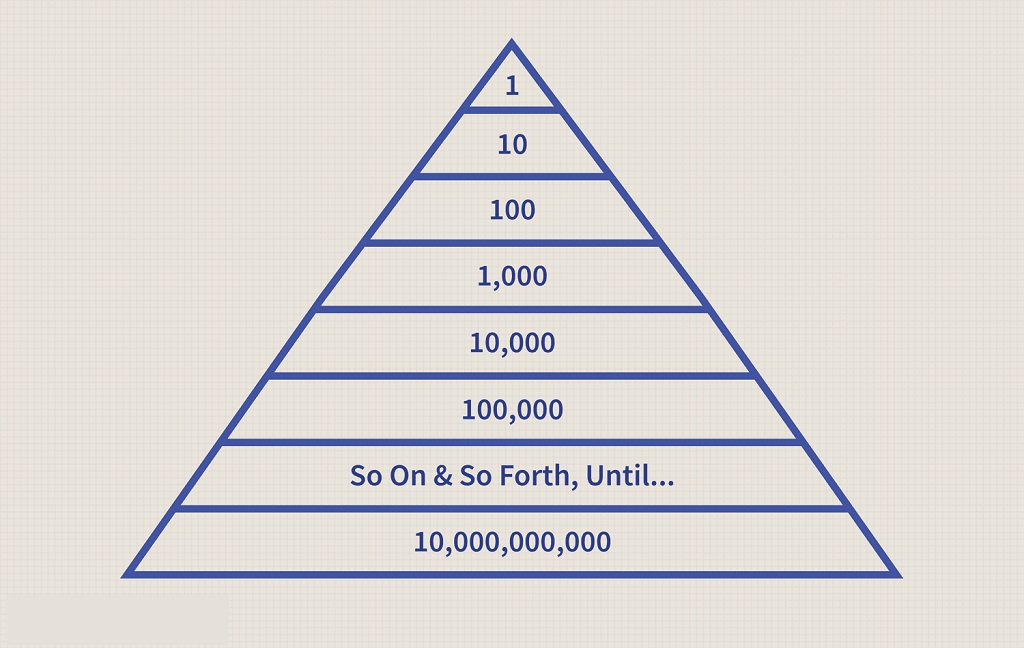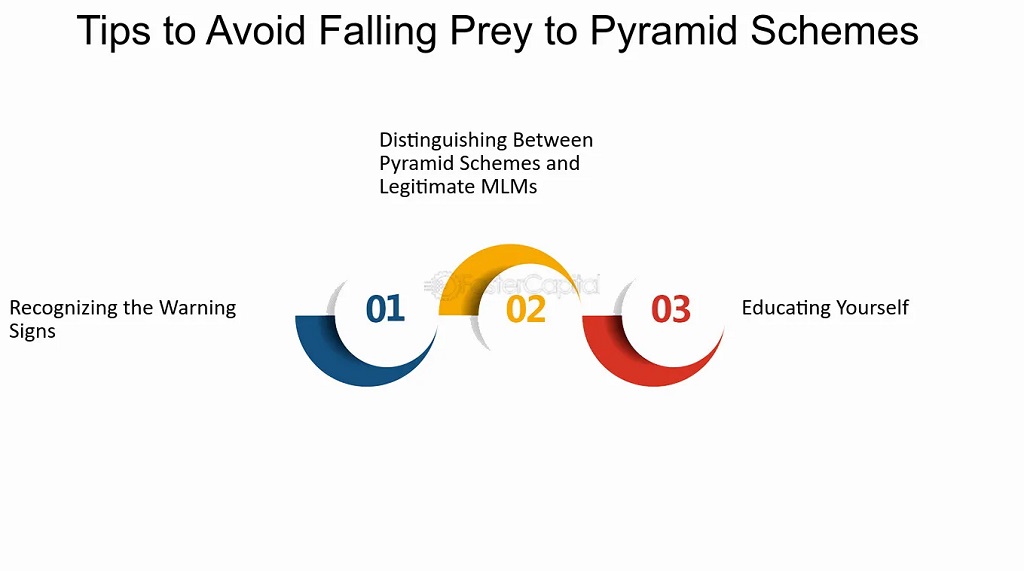A pyramid scheme is a fraudulent business model where participants earn money primarily by recruiting new members, rather than selling products or services. In a pyramid scheme, each participant pays an upfront fee to join and is promised significant earnings for enrolling others into the scheme.
However, the sustainability of these earnings relies solely on the continual recruitment of new participants, making it an inherently unstable and unsustainable business practice. These schemes often collapse when the recruitment pool dries up, leaving the majority of participants at a financial loss.
As such, pyramid schemes are illegal in many countries due to their deceptive nature and inherent risk of financial harm.
Understanding Pyramid Schemes
Pyramid schemes involve recruiting members to invest in a venture promising high returns. The structure relies on recruiting new investors to generate profits for existing members, making it unsustainable and illegal in many jurisdictions. Understanding the definition of a pyramid scheme is essential to avoid falling victim to financial fraud.
Understanding Pyramid Schemes can be deceiving, and it’s important to clearly understand how they operate to protect yourself and others from falling victim to these fraudulent practices. This section will delve into the structure and operation of pyramid schemes, and shed light on their illegal aspects. For more in-depth discussions and information on such deceptive practices, resources like the link feel blog can be highly informative and useful.
Structure And Operation
Pyramid schemes typically follow a specific structure and operate by recruiting participants and encouraging them to invest or pay a fee to join the scheme. These schemes rely heavily on recruitment, promising participants the opportunity to earn money by recruiting more people into the scheme. One distinct characteristic of pyramid schemes is the emphasis on recruitment rather than selling products or services. Participants are often required to purchase inventory or invest large sums of money to advance within the scheme. This hierarchical structure creates a pyramid-like shape, with the scheme’s originator at the top, followed by a few early participants who benefit the most, and a large number of individuals at the bottom who struggle to recoup their investments. Besides recruitment, pyramid schemes may offer meager payouts to existing participants using funds from recruits. These payouts create a false sense of success and entice participants to continue recruiting others into the scheme. However, as the scheme grows and reaches its saturation point, it becomes increasingly difficult for recruits to join, leading to the scheme’s collapse, leaving the majority of participants at a loss.
Illegal Aspects
It’s crucial to understand that pyramid schemes are illegal in most countries, including the United States. The primary reason is that pyramid schemes are unsustainable and inevitably lead to financial loss for most participants. They depend on the constant influx of recruits to sustain the payouts for existing participants, which is not a sustainable business model.
The deceptive nature of pyramid schemes lies in their promise of quick and easy money, often using key phrases like “financial freedom” or “get rich quick.” This lure leads many individuals to invest their hard-earned money based on false promises. Regulatory authorities and law enforcement agencies actively monitor and crack down on these illegal activities to protect consumers from falling victim to pyramid schemes. If you find yourself involved in or approached by a pyramid scheme, it’s essential to report it to the relevant authorities to help prevent others from being exploited.
Being knowledgeable about the structure and operation of pyramid schemes, along with their illegal aspects, empowers you to recognize and avoid these fraudulent practices. Remember, legitimate business opportunities are built on genuine products and services, rather than a reliance on recruitment and investments. Stay informed and protect yourself from the perils of pyramid schemes.
Spotting A Pyramid Scheme
A pyramid scheme is a fraudulent business model that promises high returns to participants based on recruiting new participants rather than selling products or services. Spotting a pyramid scheme is crucial to protecting yourself and others from financial loss and deception.
Promises Of High Returns
One key characteristic of a pyramid scheme is the emphasis on promising high returns on investment. These schemes often lure people in with the prospect of making substantial amounts of money quickly and with minimal effort. It is important to remember that legitimate investments come with risk, and any promise of guaranteed high returns should be met with skepticism. This is a critical distinction to make when evaluating business models, similar to assessing whether is alphasights a consulting firm or something else. In a pyramid scheme, the focus is not on selling products or services but recruiting new members. The money obtained from these recruits is used to pay the existing participants, creating the illusion of profitability.
Emphasis On Recruitment
The second red flag to watch out for is the heavy emphasis on recruitment. Pyramid schemes thrive on recruitment and expansion, as this is how they sustain their operation. Participants are often encouraged to recruit friends, family, and acquaintances into the scheme, creating a never-ending chain of new members.
This emphasis on recruitment is often characterized by aggressive marketing tactics and pressure to bring in recruits. Language like “changing your life,” “unlimited earning potential,” and “once in a lifetime opportunity” are commonly used by pyramid scheme recruiters to entice individuals into joining.
It’s important to note that legitimate businesses focus on selling products or services, not solely on recruiting new members. If recruitment is the primary focus rather than selling actual goods or services, it is a strong indication of a pyramid scheme.
Impacts Of Pyramid Schemes
Pyramid schemes can severely impact individuals, communities, and the economy. Understanding these impacts is crucial in recognizing the dangers associated with such fraudulent schemes. From financial devastation to social consequences, the repercussions of pyramid schemes can be widespread and devastating.
Financial Loss
Financial loss is the foremost impact of pyramid schemes. Participants at the bottom of the pyramid end up losing their initial investment, often resulting in significant financial hardship. The promise of easy money lures individuals into these schemes, only for them to realize the harsh reality when the scheme collapses.
Social Consequences
Social consequences are another significant impact of pyramid schemes. Trust among friends, family members, or acquaintances can be shattered when they are recruited into these schemes, resulting in strained relationships and social isolation. Moreover, the overall integrity of the community can be compromised with the spread of such fraudulent activities.
Legal Actions Against Pyramid Schemes
When it comes to pyramid schemes, legal remedies play a vital role in protecting consumers and the integrity of the market. Understanding the legal actions taken against these fraudulent schemes is crucial in safeguarding oneself from potential scams. In this article, we will delve into the regulatory measures and enforcement and prosecution tactics used to combat pyramid schemes.
Regulatory Measures
Regulatory measures are put in place to prevent and deter pyramid scheme operators from deceiving innocent individuals. These measures are implemented by government agencies and financial regulators to ensure fair trade and consumer protection.
Some common regulatory measures include:
- Licensing Requirements: Authorities require pyramid scheme operators to obtain proper licensing, ensuring they meet necessary legal standards.
- Disclosure of Information: Operators must disclose relevant information about their business model, compensation structure, and the risks involved, offering potential participants complete transparency.
- Prohibition of Recruitment-Based Compensation: Regulatory bodies prohibit schemes that primarily reward participants for recruitment rather than the sale of genuine products or services.
These regulatory measures act as a deterrent, making it harder for pyramid schemes to operate and protect individuals from falling victim to these fraudulent practices.
Enforcement And Prosecution
While regulatory measures set the groundwork for combating pyramid schemes, vigorous enforcement and prosecution are essential in taking legal action against those involved in running these illegal operations.
Authorities utilize a range of enforcement and prosecution tactics to bust pyramid scheme networks, bring the perpetrators to justice, and compensate victims. Some common tactics include:
- Investigations: Authorities launch detailed investigations to gather evidence against pyramid scheme operators and determine the extent of their illegal activities.
- Seizure of Assets: Law enforcement agencies may freeze or seize the assets of pyramid scheme operators to prevent them from dissipating or hiding funds obtained through fraudulent means, enabling compensation for victims.
- Civil Lawsuits: Victims of pyramid schemes may file civil lawsuits against the operators, seeking legal redress and financial compensation for their losses.
Through strong enforcement and prosecution efforts, authorities aim to dismantle pyramid schemes, punish the culprits, and provide justice to those who have suffered financial harm as a result of their participation.
Protecting Yourself
When it comes to pyramid schemes, it’s crucial to protect yourself from falling victim to their deceptive tactics. By understanding the signs of a pyramid scheme and taking proactive steps, you can safeguard your financial well-being. In this section, we will explore two essential measures to protect yourself: Due Diligence and Seeking Professional Advice.
Due Diligence
One of the most effective ways to protect yourself from pyramid schemes is to conduct thorough due diligence before getting involved with any business opportunity. Take the time to research and gather information about the company or organization offering the opportunity. This will help you determine if the business is legitimate or shows signs of being a pyramid scheme.
During your due diligence, pay close attention to the following:
- Company Background: Obtain a clear understanding of the company’s history, reputation, and track record. Look for any red flags or negative reviews indicating a potential pyramid scheme.
- Compensation Structure: Examine the compensation plan provided by the company. Pyramid schemes often focus on recruitment and emphasize earning money through bringing in new members, rather than selling genuine products or services. Be wary of systems that heavily rely on recruitment rather than product sales.
- Product or Service Value: Evaluate the value and quality of the products or services offered by the company. Pyramid schemes often have low-quality or non-existent products, and the focus is primarily on recruiting new members to boost earnings. Genuine businesses prioritize their products or services, ensuring they have value and can be effectively marketed.
- Legal Compliance: Check if the company is registered and operating in compliance with your country’s laws and regulations. Schemes often operate illegally or have questionable practices, which can put you at risk.
Seeking Professional Advice
If you’re unsure about a business opportunity or suspect it may be a pyramid scheme, seeking professional advice can provide valuable insights and guidance. A qualified attorney or financial advisor with experience dealing with legal matters and investment schemes can help assess the opportunity’s legitimacy and guide you in making informed decisions.
When consulting a professional, make sure to:
- Choose an Expert: Select an attorney or financial advisor specializing in business law or investment schemes. Their expertise in these fields will ensure they have the necessary knowledge to evaluate the business opportunity.
- Provide the Facts: Provide them with all the relevant information and documentation related to the opportunity. This will allow them to analyze the details and provide you with accurate advice.
- Ask Questions: Feel free to ask any questions and seek clarification during your consultation. Understanding the risks and legal implications will empower you to make informed decisions.
Remember, protecting yourself from schemes starts with being vigilant, conducting due diligence, and seeking professional advice. By following these steps, you can confidently navigate the business landscape and protect your financial well-being.
Frequently Asked Questions Of Pyramid Scheme Definition
What Is A Pyramid Scheme?
A pyramid scheme is a fraudulent investment scheme where early investors are paid with funds from recruits, rather than from actual profits. As more recruits join, the scheme becomes unsustainable and collapses, leaving most participants with financial losses.
How Does A Pyramid Scheme Work?
In a pyramid scheme, participants are promised huge returns for recruiting others into the scheme. The recruits then recruit more participants, and the cycle continues. However, since no actual product or service is being sold, the scheme relies solely on continuously recruiting new members to sustain itself.
Is A Pyramid Scheme Illegal?
Yes, pyramid schemes are illegal in most countries because they rely on deceiving people, resulting in financial harm. They are considered fraudulent schemes that exploit individuals by promising unrealistic returns. Recognizing the signs of a scheme is important to avoid becoming a victim.
Conclusion
In essence, a scheme is a fraudulent business model that relies on recruiting members and fees to generate income. Understanding why Pyramid Schemes are illegal is essential to avoid falling victim to potential scams, as these fraudulent schemes exploit individuals through unsustainable business models that prioritize recruitment over legitimate product or service transactions. Recognizing the warning signs and educating others can help protect ourselves and our communities from such deceptive practices.



